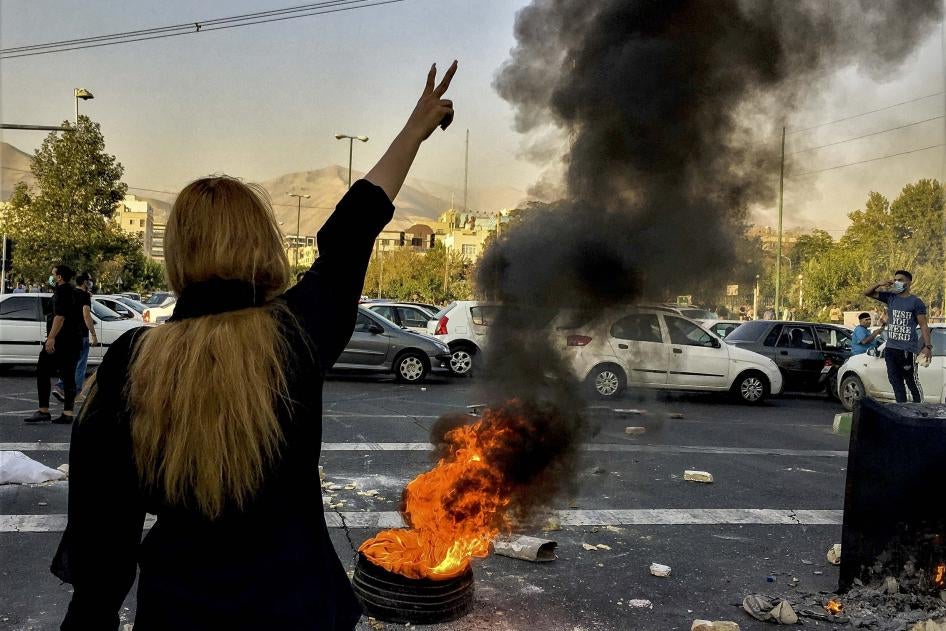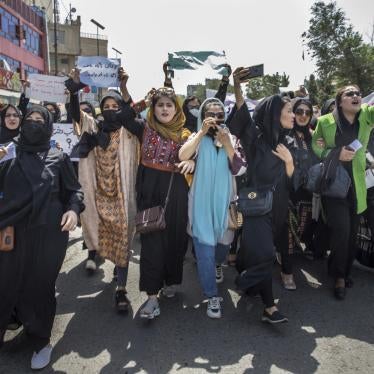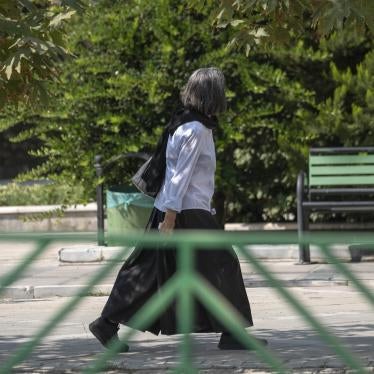A new protest movement has gripped Iran since September, following the death in custody of an Iranian Kurdish woman, Mahsa (Jina) Amini , who had been arrested by Iran’s morality police for breach of the country’s strict dress code. Women and men, girls and boys, of various ethnic backgrounds in the big cities and small towns, university campuses and schools, have united under the chant “Woman, Life, Freedom!” asserting that freedom and rights for women can help bring to an end repression for all.
Around the world, these protests are having a resounding effect, but some of the most powerful governments in the Global South, like India, are failing to stand by Iranians demanding their rights.
Iranian authorities have responded to the protests with predictable—and outrageous—repression, including mass arrests and killings of hundreds of people . Thousands are detained in overcrowded prisons and deprived of their due process rights. These include human rights defenders, activists, journalists, and lawyers arrested for their peaceful dissent or support of the protests. The authorities also confiscated passports and placed travel bans on dozens of public figures , including actors and athletes.
As of January 25, Iranian authorities had executed four young men for their alleged roles in harming or killing members of security forces during the protests following grossly unfair trials that violated not only international standards but also domestic safeguards.
Fear is growing that Iran is preparing to execute more protesters, charging them with “enmity against God” and “corruption on earth.” Iranian courts, and particularly revolutionary courts, regularly fall far short of providing fair trials and use confessions often coerced under torture as evidence in court. The authorities have failed to meaningfully investigate numerous allegations of torture against detainees and routinely restrict detainees’ access to legal counsel.
But Iranians are continuing to demand fundamental change. For women and girls, the repression they face is life-long. It is no surprise then that brave schoolgirls and young women who are university students are on the front lines, raising up their headscarves, marching through the streets, and chasing off government officials as they fight for their right to be treated as equal members of society.
Women have been fighting against the compulsory dress code for decades . Iran’s restrictive rules require girls to wear the hijab upon reaching puberty, following which they continue to be denied their choice of dress throughout their life, affecting their right to take part in all aspects of public life from the act of walking out their front door to study and work.
They can be fined or hauled into detention to be “educated,” beaten, and harassed, for breach of the dress code if, as in Mahsa’s case, a morality police official deems that the way they wear their hijab is “improper.” Those accused of protesting against the dress code can be sentenced to prison. But now, women are openly defying the dress code as an act of resistance by simply going out to live their lives without the hijab.
While the protest against the mandatory use of the hijab has been the most visible, Iranian girls and women are also protesting other discriminatory rules and calling for wholesale change to achieve their fundamental rights and freedoms.
Iran’s laws and policies discriminate against women’s access to employment including by restricting the professions they can enter and denying them equal benefits. There is no law to punish employers for outright discrimination against women. In 2017, Human Rights Watch found that employers routinely advertise jobs for men over women, and some require written consent from husbands and fiancés.
Women are also disproportionately affected by the economic crisis in Iran, which has pushed many to the margins of poverty. Women’s unemployment rate is more than double the rate for men, even though more than 50 percent of Iran’s university graduates are women. The gap has only widened since the Covid-19 pandemic: women’s labor force participation in 2019 was barely 18 percent, and fell to 14 per cent in 2020.
Iranian authorities, rather than tackling women’s economic struggles, are instead trying to force women to marry earlier and have more children. A population law passed in November 2021 outlawed sterilization for men and women and free distribution of contraceptives in the public health care system unless a pregnancy threatens a woman’s health, and further limited access to safe abortion.
The same law provided incentives for early marriage such as interest free loans to those who marry at 25 and younger. Indeed, child marriage is on the rise . Iran’s civil code provides that girls can marry at 13 and boys at 15, and younger if authorized by a judge.
Iran’s laws also grant husbands significant control over their wives’ lives. Under the Civil Code, the husband has the right to choose where they live, and he can prevent his wife from having certain jobs if he thinks that they might harm “family values.” Under the Passports Law , a woman needs her husband’s permission to obtain a passport and travel outside the country.
Such discrimination leaves women exposed to violence. There are increasing reports of horrific femicides and of women risking their lives to escape abuse. Yet, Iran has still not adopted a law to prevent abuse, protect women, and prosecute domestic violence. In many femicide cases, prosecutors, and judges do not press for adequate penalties.
Women have faced arrest, torture, imprisonment, and even death sentences fighting discriminatory laws and policies from the dress code to sexual harassment , achieving some reforms . In January, the courts sentenced two women's rights defenders who campaigned against sexual harassment to prison terms—five years for Noushin Keshavarznia for collusion against national security and six for Reyhaneh Taravati for propaganda against the regime.
The current protests echo the frustrations of people tired of living without fundamental rights, and of being ruled by those who callously disregard the welfare of their people.
The Iranian authorities – and the world – should listen. But with rising authoritarianism, corruption, and lack of accountability, as people have taken to the streets including in Sri Lanka, Peru, Hong Kong, Myanmar or India, the authorities have responded with abusive crackdowns. Fear of being called out for their own domestic abuses make governments reluctant to defend the rights of protesting Iranian people.
In November, members of the UN Human Rights Council voted to establish an independent international fact-finding mission to thoroughly and independently investigate alleged human rights violations in Iran related to these protests and to collect, consolidate, and analyze evidence of such violations, and preserve evidence, including in view of cooperation in any future legal proceedings.
However, India, Brazil, and Malaysia, which should have lent their support, disappointingly abstained, while China voted against the measure. It is important for governments to act in a rights respecting manner at home, and to call upon their allies to do so as well, so that they can all live up to their global human rights responsibilities.
Iranian women and others who are fighting for basic rights deserve support particularly from global south leaders who envision a more just and equitable global order.










